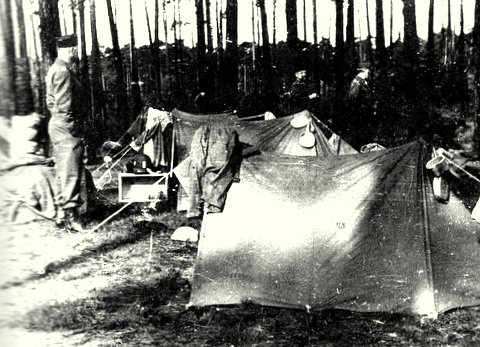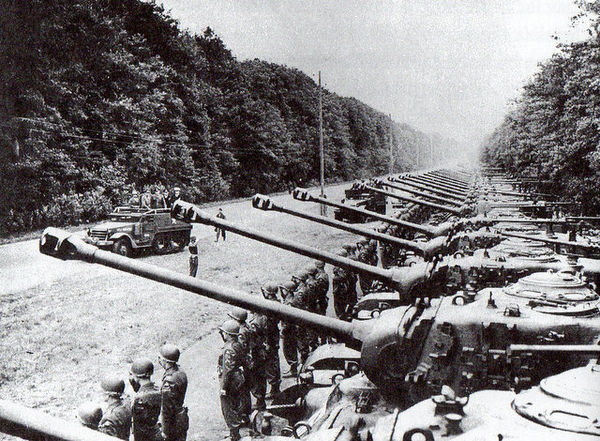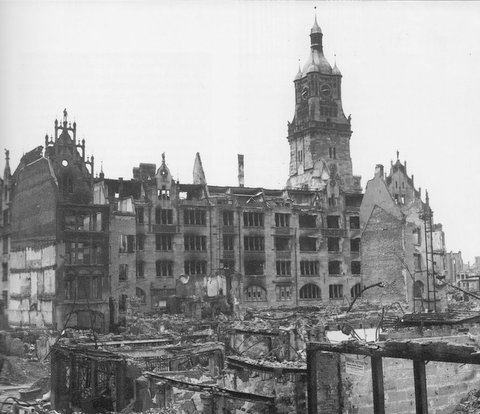Occupied Germany Zones disputed by U.S., Russia and France - 1945
Nov 23, 2014 15:41:55 #
The Soviet armies sealed off Berlin from American, British and French occupation troops for two months before permitting them to enter. The reception was not cordial. Preliminary meetings with Marshal Zhukov on June 29, 1945 inside Berlin -- to discuss the arrangements needed prior to arrival of Allied occupation forces -- soon turned testy. Zhukov severely limited the access routes, traffic volumes, and times of transport through the Soviet Occupation Zone. And he demanded to know how long the Americans would take to evacuate the parts of the Soviet Zone occupied by U.S. armies since VE Day in May.
In June, 1945, American and British armies occupied about 16,400 square miles of territory assigned to the Soviet Zone by the Yalta Conference. (The Potsdam Conference had not been held yet.) The Red Army held 185 square miles of Allied-designated sectors in Berlin. That was Zhukov's trade. He would let the West in after they withdrew.
Later, Gen. Lucius Clay (Eisenhower's representative) wrote: "I think now that I was mistaken in not, at that time, making free access to Berlin a condition to our withdrawal into our occupation zone. ... The Soviet Government seems to be able to find technical reasons at will to justify the violation of understandings whether verbal or written." Perhaps we should have had a "Philadelphia Lawyer" on Clay's staff.
But another Ally also could be equally "difficult."
The French 1st Army had taken the German cities of Karlsruhe and Stuttgart in April, 1945, designated for the American Zone. Since the French were not signatories to the Yalta Conference, they did not feel obligated to honor the Occupation Zone borders set by the Americans, British and Russians. They wanted to keep the cities and areas they now occupied.
In fact, even before Yalta, the French Provisional Government had requested an Occupation Zone so large that it included Frankfurt and Mannheim as well, creating a broad French Zone separating the British and American Zones. That was a non-starter. But Eisenhower was forced to barter, swapping sections of the U.S. and British Zones for withdrawals by the French. The dickering was not finalized until July 26, 1945. During that four-month period, Stuttgart and Karlsruhe remained under French occupation.
The transfer of power was just as testy as with the Soviets. The American detachment which replaced the French in Karlsruhe reported: "The policy of the French seemed to be to remove everything that could be moved. When their vehicles were not enough they asked for U.S. help, and the detachment was directed ... to supply its one truck. During the week following entry into Karlsruhe every officer spent most of his time trying to stop the 'equipment repatriation' that extended even into our own personal billets. On one occasion we had to alert the security trops who, at the point of a machine gun, blocked the attempted removal of the city's fire engines."
On Sunday, July 8, 1945, a U.S. Army cleaning detail was sent into Karlsruhe to prepare the buildings they would occupy. When the French left later that morning, they took with them the detail's truck, paint, pails, brushes and ladders. Cooperation between Occupation Zones was in short supply.
In June, 1945, American and British armies occupied about 16,400 square miles of territory assigned to the Soviet Zone by the Yalta Conference. (The Potsdam Conference had not been held yet.) The Red Army held 185 square miles of Allied-designated sectors in Berlin. That was Zhukov's trade. He would let the West in after they withdrew.
Later, Gen. Lucius Clay (Eisenhower's representative) wrote: "I think now that I was mistaken in not, at that time, making free access to Berlin a condition to our withdrawal into our occupation zone. ... The Soviet Government seems to be able to find technical reasons at will to justify the violation of understandings whether verbal or written." Perhaps we should have had a "Philadelphia Lawyer" on Clay's staff.
But another Ally also could be equally "difficult."
The French 1st Army had taken the German cities of Karlsruhe and Stuttgart in April, 1945, designated for the American Zone. Since the French were not signatories to the Yalta Conference, they did not feel obligated to honor the Occupation Zone borders set by the Americans, British and Russians. They wanted to keep the cities and areas they now occupied.
In fact, even before Yalta, the French Provisional Government had requested an Occupation Zone so large that it included Frankfurt and Mannheim as well, creating a broad French Zone separating the British and American Zones. That was a non-starter. But Eisenhower was forced to barter, swapping sections of the U.S. and British Zones for withdrawals by the French. The dickering was not finalized until July 26, 1945. During that four-month period, Stuttgart and Karlsruhe remained under French occupation.
The transfer of power was just as testy as with the Soviets. The American detachment which replaced the French in Karlsruhe reported: "The policy of the French seemed to be to remove everything that could be moved. When their vehicles were not enough they asked for U.S. help, and the detachment was directed ... to supply its one truck. During the week following entry into Karlsruhe every officer spent most of his time trying to stop the 'equipment repatriation' that extended even into our own personal billets. On one occasion we had to alert the security trops who, at the point of a machine gun, blocked the attempted removal of the city's fire engines."
On Sunday, July 8, 1945, a U.S. Army cleaning detail was sent into Karlsruhe to prepare the buildings they would occupy. When the French left later that morning, they took with them the detail's truck, paint, pails, brushes and ladders. Cooperation between Occupation Zones was in short supply.
U.S. detachment in battle dress and full field gear camp outside Occupied Berlin - July 1, 1945

Gen. George C. Marshall inspects 2nd Armored Div. ("Hell On Wheels") in Occupied Berlin - July 21, 1945

Stuttgart had 53 air raids before this 1945 photo of City Hall ruins - Occupied Germany, 1945

Nov 23, 2014 16:17:03 #
And to think much of that could have been avoided, and much else if the Allies had listened to Churchill when he warned repeatedly, year after year, that the Russians weren't to be trusted.
Thanks so much for the posting of these historical events, reminiscences and photos. Very much enjoyed, appreciated and looked forward to.
Thanks so much for the posting of these historical events, reminiscences and photos. Very much enjoyed, appreciated and looked forward to.
Nov 23, 2014 16:54:24 #
Thank you for such an informative report. I was too young at the time to understand the sacrifices made by so many. The older I get, the more I appreciate those who went before. Hopefully we learned from these events.
Nov 23, 2014 16:58:01 #
Great post again! Thanks Richard. Excellent pics, the third is a great but sad photo. I'd like to think this is a bygone era but history says otherwise.
Nov 23, 2014 18:20:51 #
Nov 23, 2014 18:41:59 #
DrWilk wrote:
And to think much of that could have been avoided, and much else if the Allies had listened to Churchill when he warned repeatedly, year after year, that the Russians weren't to be trusted.
Thanks so much for the posting of these historical events, reminiscences and photos. Very much enjoyed, appreciated and looked forward to.
Thanks so much for the posting of these historical events, reminiscences and photos. Very much enjoyed, appreciated and looked forward to.
Thanks for your comments, Dr. Wilk. I really value them. Eisenhower was guided in his relations with the Russians by his orders to minimize the time of combat and the need for all those troops in the ETO. Troops were already being transferred from the ETO to the Pacific Theater (with an interim furlough in the USA) at the request of Gen. MacArthur, months before VE Day. Ike did not want complications. The Assistant Secretary of War, John J. McCloy (who later became the High Commissoner for Germany when the Military Gocernment phase ended in 1949) had recommended Gen. Clay for the negotiations with Marshal Zhukov, and instructed Clay not to press controversial matters to the point of dissension. The U.S. public was definitely not willing to risk war with Russia in order to protect the Germans.
We must also recognize that neither we nor the British were willing to permit a Russian military convoy to pass through our Occupation Zones. The Russians wanted to do that to collect their share of reparations from the Ruhr plants.
Nov 23, 2014 18:52:29 #
Camlane wrote:
Thank you for such an informative report. I was too young at the time to understand the sacrifices made by so many. The older I get, the more I appreciate those who went before. Hopefully we learned from these events.
Thank you for your comments,Camlane. I'm afraid the subsequent wars since 1945 indicate that our various leaders either were not savvy enough to prevent a crisis from arising, or were too eager to quell a situation by force.
Nov 23, 2014 19:00:52 #
BassmanBruce wrote:
Great post again! Thanks Richard. Excellent pics, the third is a great but sad photo. I'd like to think this is a bygone era but history says otherwise.
Thank you for your comments, Bruce. The destruction of so many beautiful cities, both by the Nazis and the Allies, must not be shoved into file cabinet drawers and forgotten. Nor should we forget the millions of lives ruthlessly snuffed out by the Holocaust and the bombings and armies surging through civilian streets. As I write this, it's happening again in the Ukraine and various African nations.
Nov 23, 2014 19:02:01 #
jederick wrote:
:thumbup: :thumbup: :thumbup:
Thank you for the thumbs up, jederick! Much appreciated.
Nov 23, 2014 19:11:22 #
Just wondering Richard, if you've been able to get back to Germany either since the war or since the wall came down? They've done a remarkable job fixing it up, almost too much. There's very little remaining to remind people either of the war,the Nazi era or the Russian occupation. Personally I think they've tried, and succeeded to well in hiding their history. Although, if you search around you can still find bullet and bomb scarred buildings in the former East Berlin.
Nov 23, 2014 19:46:56 #
DrWilk wrote:
Just wondering Richard, if you've been able to get back to Germany either since the war or since the wall came down? They've done a remarkable job fixing it up, almost too much. There's very little remaining to remind people either of the war,the Nazi era or the Russian occupation. Personally I think they've tried, and succeeded to well in hiding their history. Although, if you search around you can still find bullet and bomb scarred buildings in the former East Berlin.
In 1960 I decided to take advantage of the Wirtschaftswunder. I quit my advertising/PR job at RCA Industrial Products in New Jersey, packed my wife and kids onto a liner, and sailed to Bremen. I searched through Munich and Frankfurt, and selected J. Walter Thompson in Frankfurt, which hired me on the spot as a TV art director. At the time, Thompson was considered the world's largest ad agency, with a roster of German branches of American brands (Ford, Ponds, Kraft Foods, Marlboro, etc.) as well as various German products. I had a ball for three years, although the Arbeitsamt gave me some grief now and then. But my wife was born in Germany and was a naruralized U.S. citizen, so the State Dept. advised us that we had to move back to the states or she would lose her citizenship. Three months after we returned, the law was repealed.
I returned to Germany only once after that, in 2010, to inter her ashes in her family grave.
While I was at Thompson, I engaged in a lot of back-and-forth about the war with my co-workers, several of whom were German war vets. One was even an unwilling former SS member in the Wehrmacht, he said. I saw some ruins, of course, but 1960-63 was 15-18 years after the war. 2010 was 65 years after VE Day. I didn't see any ruins, but I did chat with various people, including a company historian at Carl Zeiss in Jena, as well as a hotel manager in Jena who was a boy when the Amis were there in 1945, before the Russians came.
Nov 23, 2014 20:07:21 #
Thank you. Although I haven't lived in Germany I have visited a number of times and travelled it extensively. It's a lovely country and has a great deal to offer the photographer, architecturally as well as geographically.
It seems most westerners go there mainly for the history surrounding the war when there is so much more to the country than that.
It seems most westerners go there mainly for the history surrounding the war when there is so much more to the country than that.
Nov 24, 2014 06:10:45 #
richosob
Loc: Lambertville, MI
Another great history lesson, thank you Richard for all the time and effort you put into your posts. It is very much appreciated.
Rich
Rich
Nov 24, 2014 08:23:55 #
Hi Richard, once again, thank you for the historical insight. I've enjoyed all of your posts since you've started them and hope you never stop. :thumbup:
Nov 24, 2014 09:23:02 #
If you want to reply, then register here. Registration is free and your account is created instantly, so you can post right away.






